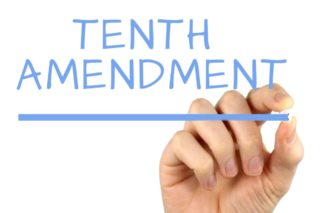 Yesterday, we wrote about the various ways that enforcement of federal cannabis laws could ensue, if the current administration were bullheaded enough to attempt such a thing. The day before, we wrote about the Washington State Attorney General’s promise to fight any potential enforcement action. Today, we offer a brief primer on what rights the states may have to uphold their medical and recreational marijuana programs in the face of federal enforcement action. The answers may surprise you.
Yesterday, we wrote about the various ways that enforcement of federal cannabis laws could ensue, if the current administration were bullheaded enough to attempt such a thing. The day before, we wrote about the Washington State Attorney General’s promise to fight any potential enforcement action. Today, we offer a brief primer on what rights the states may have to uphold their medical and recreational marijuana programs in the face of federal enforcement action. The answers may surprise you.
As a baseline matter, it is imperative to note that Article VI, Clause 2 of the U.S. Constitution declares that federal law is “the supreme law of the land,” preempting conflicting state laws. This means—and courts have confirmed—that if the federal government wants to enforce its draconian marijuana laws by targeting specific actors, it can, and states cannot stand in the way. However, if the federal government wants to force states to shut down their marijuana programs, or to use state resources to enforce federal law, it probably cannot.
The constitutional question that will determine the outcome of any lawsuit to invalidate state cannabis laws, whether for medical or recreational marijuana programs, is whether those state laws impermissibly conflict with the federal Controlled Substances Act (CSA). Another way of asking this would be: “Does the federal CSA ‘preempt’ state cannabis programs?” Given the plain language of the CSA, we think the answer is “no.”
Section 903 of the CSA includes express anti-preemption language:
No provision of this subchapter shall be construed as indicating an intent on the part of Congress to occupy the field in which that provision operates, including criminal penalties, to the exclusion of any State law on the same subject matter which would otherwise be within the authority of the State, unless there is a positive conflict between that provision of this subchapter and the State law so that the two cannot consistently stand together. (Our bold emphasis.)
What would a “positive conflict” with state law be? It may sound funny, but a positive conflict might consist of a state law requiring a citizen or state official to possess or distribute marijuana. Such a law would almost certainly violate the CSA. But, state marijuana programs that only permit individuals to traffic in federally controlled substances—because states do not proscribe them—make no such requirement. Think about it: anyone in Oregon, Washington, California, or any other state with a cannabis program, is free to ignore these state programs and follow federal law.
This begs the question as to whether the federal government could require states to shut down their programs, and assist in enforcing its horrible laws. Again, we think the answer is “no.” The Tenth Amendment to the Constitution serves as a constitutional check to the Supremacy Clause. The Tenth Amendment provides that the federal government cannot “commandeer” states by forcing them to enact laws in the federal interest, or to enforce federal laws whatsoever. In the context of cannabis, this means that neither Congress nor any federal actor can require states to enact or maintain laws prohibiting the cultivation, distribution or intra-state sale of pot.
The upshot here is that the Tenth Amendment, coupled with the express, anti-preemption language of the federal CSA, grants the states authority to run cannabis programs. This paradigm gives the states a strong argument in any potential lawsuit by the feds seeking to shutter those programs. Thus, the extremely tall and unpopular task of chasing state-approved pot merchants, would be left to the resource-poor federal government. And if the federal government really wants to go there, well, we’re in for another kind of fight.























